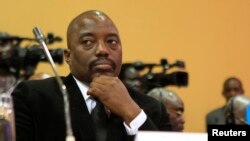President Joseph Kabila committed to holding a national dialogue when he signed a regional peace agreement at Addis Ababa in February 2013. He held what were called national consultations at the end of 2013, but some opposition parties did not take part.
Last week, Kabila announced he would be holding a dialogue with political parties, civil society and the international community as the D.R.C. prepares for elections. But the timetable is looking tight, funding is not assured, the electoral roll is missing at least 5 million new voters and the opposition claims the electoral commission will not be impartial.
The opposition has been calling for dialogue on these issues, and Kabila opened private discussions about the elections with three main opposition parties late last month.
The biggest of those parties, the UDPS or Union for Democracy and Social Progress, which claims it won the 2011 elections, will be attending the dialogue, said its spokesman in North Kivu province, Rubens Mikindo.
There needs to be a real dialogue, Mikindo said, to talk about the real problems. He said Kabila had agreed to talk about the problems that, as he put it, tarnished the 2011 elections. That has to be discussed, he argued, so as to go forward to the next elections.
Another of the three main opposition parties, the MLC or Movement for the Liberation of Congo, did attend earlier consultations but does not favor the dialogue. MLC spokeswoman Eva Bazaiba said the recommendations from those consultations were not implemented, so the MLC does not see the point in the dialogue. “What we need are elections,” she said.
The third opposition party that Kabila consulted, the UNC or Union for the Congolese Nation, does want the dialogue, said its North Kivu spokesman, Stephane Mashukano.
He said that dialogue must be permanent and that the UNC would be faithful to its political line of never betraying the Congo or its people and respecting the constitution.
One of the big unknowns in Congolese politics has been whether Kabila will try to change the constitution to run for a third term. The ruling coalition is divided on that issue.
UDPS spokesman Mikindo suggested this is why Kabila agreed to a dialogue. It's clear, he said, that there are also problems in Kabila’s camp and they have realized the need to meet with the real political forces.
Congo researcher Hans Hoebeke, who works for the International Crisis Group, said there are rumors that Kabila interest in talks could be linked to a plan by the government to have another reshuffle, following the one last December. The dialogue might be, as some people say, an attempt to divide the opposition, Hoebeke said.
With both the opposition and the ruling coalition uncertain about their own supporters and their own leadership, it remains unclear what results the dialogue will have.




